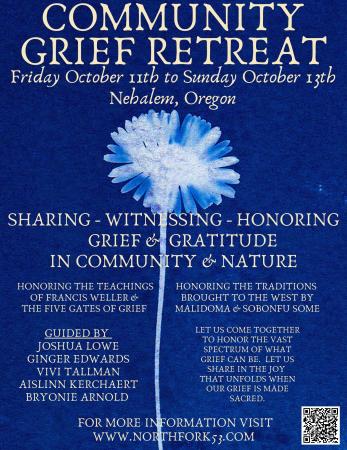Nehalem, OR; For two days an unlikely group of men and women from all walks of life have been together, working through their sorrows like compost, creating sacred ground from their grief. The words shared by the group are moving, bringing many to tears. Stories of fires, divorce, death, addiction, climate change, and despair. They’ve been guided through a weekend of writing, movement, art and sharing by a team of community grief tenders and now they’re ready. It’s time for the grief ritual.
A community grief weekend like the one described above is more popular than you might think.
Since the Covid pandemic upended normal life, people across the country have been searching for ways to deal with multiple sources of grief.
Grief of losing loved ones, jobs, marriages, daily routines, physical health, community spaces, friendships over political divisions and a sense of normal life. Nearly four years later, the grief of everything that’s changed is still below the surface for many.
Enter a growing community of grief activists. Inspired by writers like psychotherapist Francis Weller who wrote the popular book “The Wild Edge of Sorrow” and West African teachers Malidoma and Sonbonfu Some who brought their lineage of grief teachings from the Dagara tribe to the west. They believe in the healing power of communities that can grieve together.
On the weekend of October 11-13th a group called the NeahKahNie Grief Collective is hosting its first annual Community Grief Retreat at the White Clover Grange in Nehalem. Led by Santa Cruz based therapist Joshua Lowe along with local grief guides Ginger Edwards, Vivi Tallman, Bryronie Arnold and Aislinn Kercheart.
“We are creating this weekend for anyone who is struggling to find ways to deal with their grief, whether it’s over losing someone close to them or about the political divisions in our country.” Says Ginger Edwards, one of the Grief Collective’s founding members.
“We grew up in a culture that gives us no rituals or practices to help us understand and feel our grief, so most of us push it down and keep going the best we can. That unexpressed emotion builds up in us over time and shows up as overworking, addictions to food or other drugs, phone scrolling, physical health problems and even depression.”
“Grief is not something that goes away on its own. We need to tend to it, preferably in a community space where we can receive lots of love and support.” notes Joshua Lowe a family therapist who leads grief retreats for men and communities in northern California and Oregon.
“Men especially are told that connecting to their sorrow is an indication of something wrong with them. That emotions other than anger are a sign of weakness. Grief is a part of being human, it’s not meant to be shameful but an indication of what we love and care about most in the world”
The upcoming Community Grief Retreat will hold space for what author Francis Weller calls: The 5 Gates of Grief.
- Everything you love you will lose. (people, places, jobs, relationships, pets, ideas)
- Places that have never known love. (personal wounds of shame, rejection, loneliness)
- Sorrows of the world (war, politics, environmental destruction, hunger)
- What we expected but did not receive. (safety, community, belonging, health, elders)
- Ancestral (unprocessed grief passed down through families, religions and cultures)
“Grief doesn’t just show up when somebody dies” says Ginger Edwards. “We have grief tied up in everything we care about. It’s really a daily practice to allow grief to move through us and not try to judge it or push it away. I hope this grief retreat will help people understand and even welcome their grief as a sacred part of who they are.”
More information on the Community Grief Retreat and registration can be found at www.northfork53.com/events
What: Community Grief Retreat
When: October 11th-13th
Where: The White Clover Grange, Nehalem OR
Website: northfork53.com/events
Who: Facilitated by Joshua Lowe, Ginger Edwards, Vivi Tallman, Bryonie Arnold and Aislinn Kerchaert.
Contact: Ginger Edwards


